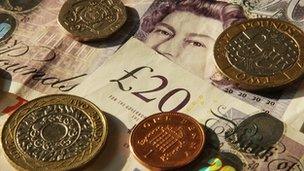UK household debt hits record high
- Published

Household debt in the UK has reached a record level, according to figures from the Bank of England.
Individuals now owe a total of £1.43 trillion, including mortgage debt, slightly above the previous high.
The previous record was set in September 2008, just before the effects of the financial crisis and the recession began to bite.
But the government said that relative to household income, debt had actually fallen.
The rise may reflect the willingness of consumers to borrow more, as a recovery comes into sight.
However, the figures may also show that families are having to borrow to deal with the higher cost of living, and to pay household bills.
The precise amount of total household debt is £1,429,624,000,000. That compares with the previous high of £1,429,595,000,000 five years ago, a difference of just £29m.
On average, that means each adult in the UK owes £28,489, including any home loans.
Indeed most of the debt is in mortgages, which have been rising steadily. So some of the increase reflects the recent recovery in house prices.
Debt-fuelled recovery?
Unsecured lending - on credit cards or with bank overdrafts - has also started to recover since the recession.
However, the figures show that unsecured borrowing actually fell in October, from £158.8bn to £158.6bn.
The news of the record debt level may increase concerns that the UK's recovery is based on increased borrowing, rather than growth sustained by rising incomes.
However, the total debt figure is not adjusted for inflation, and the Bank of England has pointed out that - relative to income - debt levels have been falling.
The ratio of debt to household income has fallen from 167% at the start of the financial crisis, to 140% now.
The government said debt has also fallen in relation to disposable income, and as a share of economic output.
Samuel Tombs, of Capital Economics, said the UK's recovery was not purely based on increased borrowing.
"Investment picked up in the latest GDP figures, and manufacturing is growing strongly," he told the BBC.
"Consumer spending and recovery in the housing market are also supported by higher employment," he added.